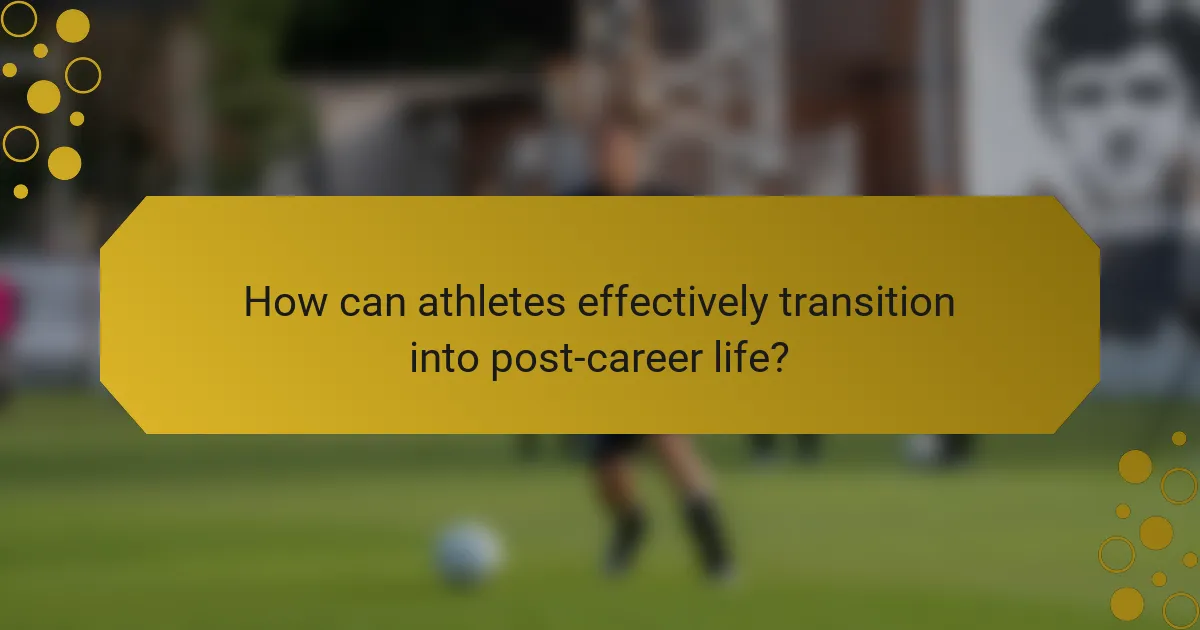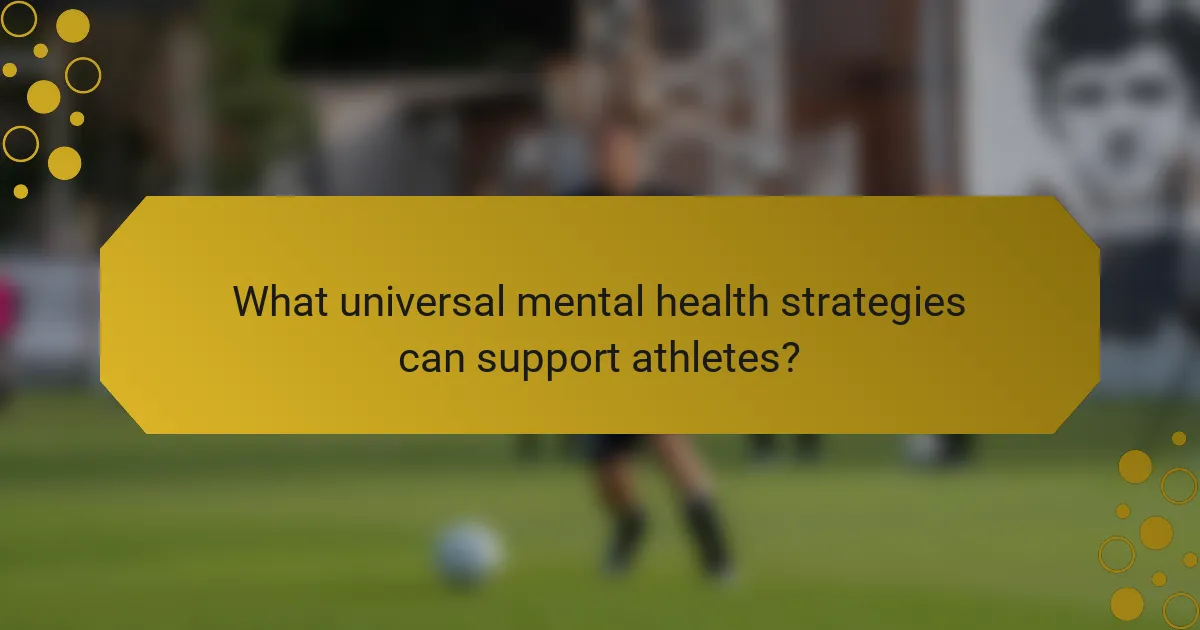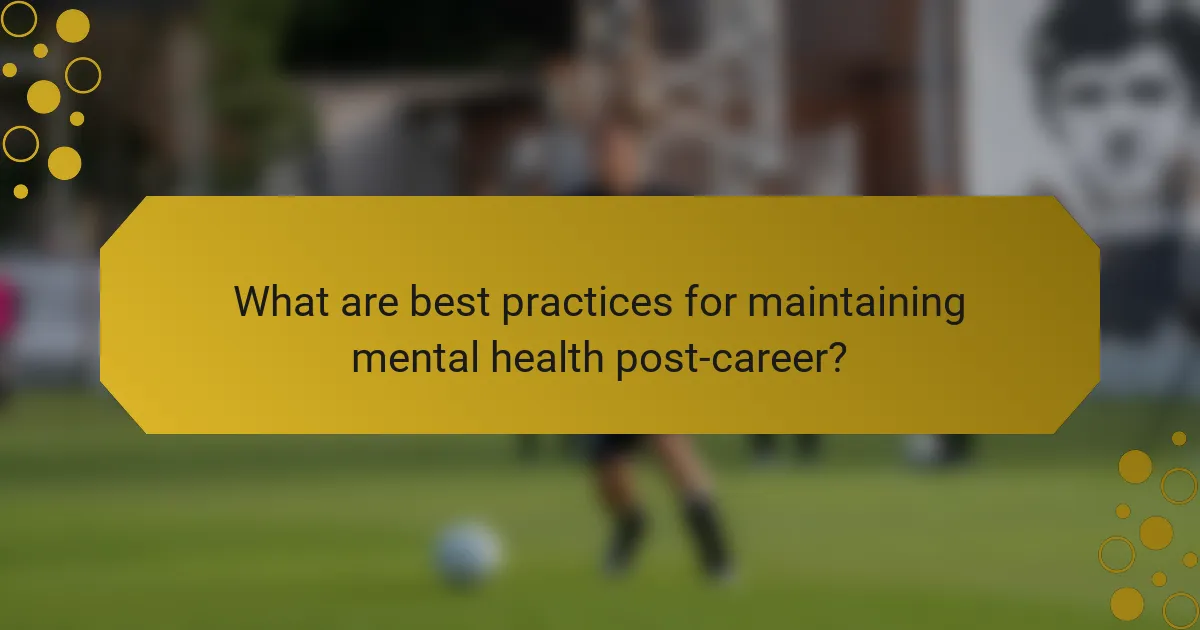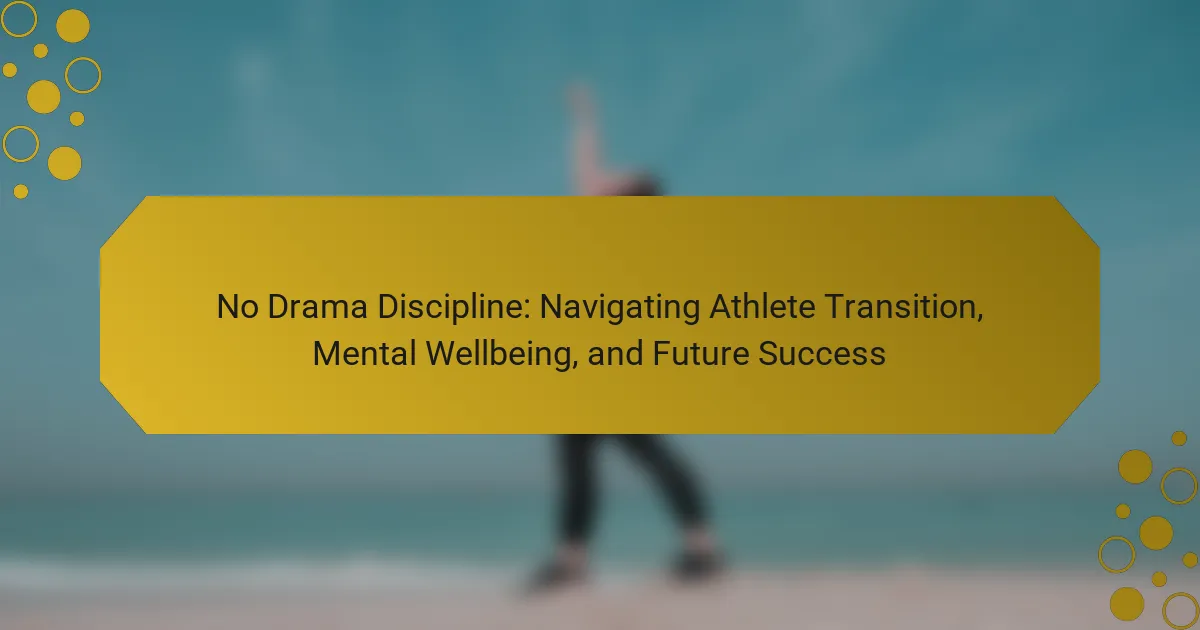Navigating the transition from athletic careers to post-sport life can be challenging for many athletes. No Drama Discipline emphasizes structured planning, mental health support, and skill development. Establishing a clear roadmap and engaging in new skills can open career opportunities. Addressing mental health issues and leveraging local resources is crucial for fostering resilience and ensuring future success.

How can athletes effectively transition into post-career life?
Athletes can effectively transition into post-career life by embracing structured planning, mental health support, and skill development. Establishing a clear roadmap helps in setting future goals. Mental wellbeing is crucial; seeking therapy or peer support fosters resilience. Engaging in new skills or education can open career opportunities, ensuring a successful transition.
What are the common challenges faced during this transition?
Athletes often face challenges during transitions, including identity loss, performance anxiety, and social isolation. These issues can significantly impact mental wellbeing and future success. Identity loss occurs when athletes struggle to redefine themselves outside their sport. Performance anxiety can arise from pressure to succeed in new roles. Social isolation may result from leaving a familiar team environment. Addressing these challenges is essential for effective navigation of the transition process.
How does identity loss impact mental health after sports?
Identity loss significantly impacts mental health after sports, leading to anxiety and depression. Athletes often struggle with transitioning to life beyond their sport, resulting in feelings of isolation and diminished self-worth. Research indicates that around 30% of retired athletes experience mental health issues related to this identity shift. Support systems and mental health resources are crucial for helping athletes navigate these changes successfully. Addressing identity loss can enhance overall mental wellbeing and promote future success in their post-sport endeavors.
What role does planning play in successful transitions?
Planning is crucial for successful transitions, as it provides a structured approach to managing change. Effective planning helps athletes navigate mental challenges and set clear goals for their future. It enhances their ability to adapt, ensuring they maintain mental wellbeing throughout the transition process. By outlining steps and anticipating obstacles, athletes can create a roadmap to success, minimizing stress and uncertainty. This proactive approach fosters resilience and empowers athletes to thrive beyond their current circumstances.
What are the essential steps for creating a post-career plan?
To create a post-career plan, athletes should follow these essential steps: assess personal values and interests, set clear goals for the future, develop a support network, and seek professional guidance. These steps promote mental wellbeing and facilitate a successful transition into life after sports.
1. Assess personal values and interests: Reflect on what matters most and identify passions outside of athletics.
2. Set clear goals: Establish both short-term and long-term objectives that align with personal aspirations.
3. Develop a support network: Connect with mentors, peers, and professionals who can provide guidance and encouragement.
4. Seek professional guidance: Consider consulting career coaches or counselors specializing in athlete transitions.
How can setting goals aid in the transition process?
Setting goals significantly aids in the transition process by providing direction and motivation. Clear objectives help athletes focus on their mental wellbeing and future success during challenging changes. Goals enhance self-efficacy, allowing athletes to track progress and celebrate achievements. This structured approach reduces anxiety and fosters resilience, essential for navigating transitions effectively.

What universal mental health strategies can support athletes?
Universal mental health strategies for athletes include establishing supportive environments, promoting open communication, and integrating mental health education. These strategies enhance resilience and foster well-being during transitions. Regular mental health check-ins can identify issues early, while mindfulness practices improve focus and reduce anxiety. Engaging in team-building activities strengthens social connections, providing emotional support. Implementing these strategies can lead to improved performance and overall mental health outcomes for athletes.
How can mindfulness practices benefit mental wellbeing?
Mindfulness practices enhance mental wellbeing by reducing stress, improving focus, and promoting emotional regulation. These practices foster resilience, which is crucial during athlete transitions. Engaging in mindfulness can lead to a 30% reduction in anxiety symptoms and a 25% increase in overall life satisfaction. Regular practice helps athletes manage performance pressures and maintain mental health, ultimately supporting future success.
What support systems are crucial for mental health?
Support systems crucial for mental health include social networks, professional counseling, and community resources. These systems provide emotional support, guidance, and practical assistance during transitions. For athletes facing changes, peer support fosters resilience and coping strategies. Professional mental health services offer tailored interventions, addressing unique challenges. Community programs enhance social connections, reducing isolation and promoting well-being.

What unique attributes contribute to a successful athlete transition?
Unique attributes that contribute to a successful athlete transition include mental resilience, adaptability, support systems, and goal-setting strategies. Mental resilience helps athletes cope with challenges, while adaptability allows them to adjust to new environments. Strong support systems, including coaches and peers, provide essential encouragement. Effective goal-setting strategies create a clear path toward future success.
How does financial literacy influence post-career success?
Financial literacy significantly enhances post-career success for athletes by equipping them with essential money management skills. Understanding finances allows athletes to make informed investment decisions, secure their financial future, and avoid common pitfalls like bankruptcy.
Research indicates that nearly 60% of former athletes face financial difficulties within five years of retirement. This statistic underscores the importance of financial education during and after an athlete’s career.
Moreover, financial literacy fosters confidence in managing income streams, such as endorsements and investments. Athletes who prioritize financial education can build wealth that supports long-term goals, ensuring stability beyond their sports careers.
In summary, financial literacy is a unique attribute that directly influences an athlete’s ability to navigate the transition from sports to successful post-career life.
What skills from sports are transferable to other careers?
Athletes develop numerous transferable skills that enhance their career prospects. Key skills include teamwork, discipline, resilience, time management, and leadership. These attributes foster adaptability and problem-solving in diverse professional environments. For example, teamwork in sports translates to effective collaboration in the workplace. Resilience helps athletes manage workplace challenges, ensuring sustained performance. Additionally, discipline cultivated through training promotes strong work ethics, essential for career advancement.

What rare mental health issues might athletes face post-career?
Athletes may face rare mental health issues like chronic traumatic encephalopathy, body image disorders, and identity crises post-career. These conditions can stem from the pressures of performance and sudden lifestyle changes. Chronic traumatic encephalopathy is a brain condition linked to repeated head injuries, affecting mood and cognition. Body image disorders can arise from intense scrutiny during athletic careers, leading to anxiety and depression. Identity crises often occur when athletes struggle to redefine themselves outside their sport, impacting their mental well-being. Addressing these issues early is crucial for successful transitions.
How can athletes recognize and address depression after retirement?
Athletes can recognize depression after retirement by observing changes in mood, motivation, and social engagement. Addressing these feelings involves seeking professional help, engaging in physical activity, and connecting with peers. Recognizing symptoms early can lead to effective management strategies.
What are the signs of anxiety specific to transitioning athletes?
Transitioning athletes may exhibit signs of anxiety such as increased stress, mood swings, and performance pressure. These symptoms can manifest as physical tension, sleep disturbances, and changes in appetite. Athletes may also experience feelings of isolation or uncertainty about their future in sports. Recognizing these signs is crucial for supporting their mental wellbeing during transitions.

What local resources are available for athlete mental health support?
Local resources for athlete mental health support include counseling services, sports psychology clinics, and community workshops. These resources aim to enhance mental wellbeing during transitions. For instance, many universities offer mental health programs specifically for athletes. Additionally, local sports organizations may provide access to mental health professionals trained in athletic contexts. Engaging with these resources can foster resilience and future success for athletes navigating challenges.
How can community programs assist in the transition process?
Community programs can play a crucial role in facilitating athlete transitions by providing support, resources, and a sense of belonging. These programs often offer mentorship opportunities, which help athletes navigate challenges and build resilience. Additionally, they foster connections among peers, enhancing mental wellbeing through shared experiences. Participation in structured activities can also promote skill development, ensuring athletes are prepared for future success. By addressing both emotional and practical needs, community programs significantly ease the transition process for athletes.
What role do sports organizations play in athlete mental health?
Sports organizations play a crucial role in supporting athlete mental health by providing resources and fostering environments conducive to well-being. They implement programs focused on mental health education, offer access to counseling services, and promote open discussions about mental wellness. These initiatives help athletes navigate transitions, reduce stigma, and enhance overall mental resilience. By prioritizing mental health, organizations contribute to athletes’ long-term success and well-being.

What are best practices for maintaining mental health post-career?
Maintaining mental health post-career involves proactive strategies that enhance well-being. Engage in regular physical activity, which boosts mood and reduces anxiety. Establish a supportive network of friends and mentors who understand the transition challenges. Practice mindfulness techniques, such as meditation or yoga, to foster emotional resilience. Set new personal goals to create a sense of purpose beyond sports. Prioritize professional counseling if feelings of loss or depression arise, as it can provide essential coping strategies.
How can athletes build a supportive network after retirement?
Athletes can build a supportive network after retirement by engaging with peers, mentors, and community organizations. Establishing connections with former teammates fosters camaraderie and shared experiences. Joining professional associations provides access to resources and networking opportunities. Volunteering in sports or mentoring young athletes enhances community ties and personal fulfillment. Utilizing social media platforms can also facilitate ongoing relationships and support systems.
What common mistakes should athletes avoid in their transition?
Athletes should avoid common mistakes during their transition, including neglecting mental health, failing to set clear goals, and resisting change. Prioritizing mental wellbeing is crucial; emotional resilience fosters adaptability. Setting specific, measurable goals helps maintain focus and motivation. Embracing change allows athletes to evolve and find new opportunities.
What expert insights can enhance post-career planning?
Expert insights can significantly improve post-career planning for athletes by focusing on mental wellbeing and skill transfer. Emphasizing resilience and adaptability prepares athletes for life beyond sports. Developing a structured transition plan enhances self-awareness and identifies new career opportunities. Engaging with mentors offers personalized guidance, while workshops on financial literacy and career development provide essential skills. Lastly, fostering a supportive community encourages ongoing growth and connection.
